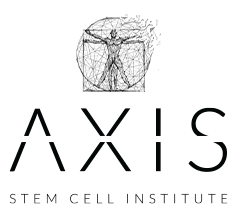
Multiple Sclerosis
our areas of focus
Multiple sclerosis is a life-altering neurodegenerative disease that affects an increasing amount of patients yearly. Fortunately, at Axis Stem Cell Institute, stem cell therapy can help you regain your active lifestyle and achieve relief from associated symptoms.
What is Multiple Sclerosis?
The central nervous system is one of the body’s most important networks responsible for life in the body – it includes the brain, spinal cord, optic nerve, and extensive nervous network which provides stimulus and feedback to the peripheral nervous system. Multiple sclerosis (MS) is a debilitating autoimmune disease of the CNS that is characterized by the degradation of the protective myelin sheath that surrounds nerve fibers throughout the body. It can also attack the nerves themselves. This process can inhibit nerve transmissions causing a variety of symptoms including chronic pain, gait dysfunction, vision problems, fatigue, muscle spasms, limited mobility, and cognitive and emotional disruptions. Symptoms can range from mild to so severe and there is currently no cure for multiple sclerosis.
What Causes Multiple Sclerosis?
At its core, we know that multiple sclerosis is caused by an autoimmune response. However, there is still much ongoing research about the exact causes of the disease. It’s thought that there may be genetic factors or it could be caused by an infection by viruses or bacteria. There may also be lifestyle or environmental factors like obesity, smoking, toxic exposure, or vitamin D deficiency. Finally, there may also be geographical factors and people who live in certain areas may be more likely to develop it.
How Can Stem Cells Help Multiple Sclerosis?
Stem cells for multiple sclerosis can be one of the most effective ways to repair nerve tissue damaged by an autoimmune response. It can also be a way to repair the myelin-producing mechanisms in the body, better protecting the nerve tissue and allowing for better nerve transmission. Stem cells are introduced safely into the spinal canal below the termination of the spinal cord, and placed directly into the spinal fluid. This fluid then carries the stem cells up to the brain, therefore having access to repair the complex nerve network from the source. Stem cells can help reduce systemic chronic inflammation, a contributor to many multiple sclerosis symptoms.
Stem Cell Therapy for Multiple Sclerosis
Stem cell therapy for multiple sclerosis begins by collecting tissue from another area of your body – it can then be isolated into stem cells. Stem cells can also be derived from a screened donor source. These stem cells are then injected intrathecally, or into the spinal canal. There, they begin to regenerate new tissue and support the body’s tissue-regenerating mechanisms. Stem cell therapy is performed as an outpatient procedure, meaning you can return home afterward. During a consultation at our Kirkland and St. Petersburg locations, our stem cell experts can help you understand what to expect from stem cell therapy for multiple sclerosis.
Schedule a Consultation
At Axis Stem Cell Institute, our team can help you explore your best options for regenerative medicine to break free of pain and symptoms. To learn more, contact us online through our contact form or give us a call to set up an appointment.

